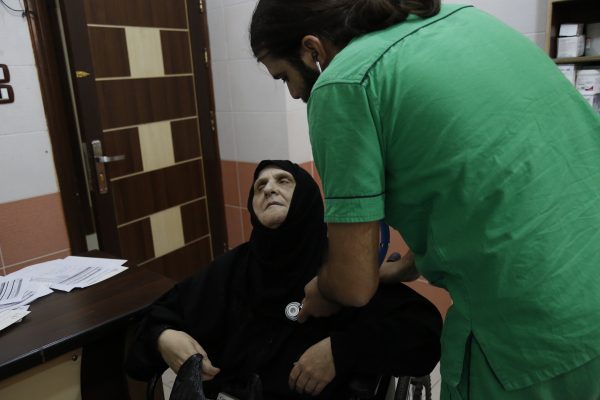Fadwa Wishes to Die

An elderly woman is examined at the internal medicine clinic of the al-Quds hospital in Aleppo. Photo: Mujahid Abu al-Jud.
Fadwa, my 24-year-old cousin, is a paraplegic. During my last visit to see her – she can’t leave the house due to her condition – we had a heart-to-heart.
I asked her to tell me everything that was on her mind, as we are also friends, not just cousins.
She told me that she had been thinking about what she described as the worst night of her life, June 22, 2013. That was when she was badly injured in a regime air raid.
“My family and I had gone to bed at nine pm, it was summertime and we went to sleep early so that we would be able to wake at dawn and work in our land,” Fadwa said.
“In the middle of the night, we were woken by the sound of regime bombing. Our village was being targeted by cluster bombs, leaving destruction and death everywhere.”
Shifting in her wheelchair, she said, “My family fled to a cave on our neighbour’s land, I was running behind them but a cluster bomb fell a few metres from me and shrapnel hit my spinal cord. After that, I no longer felt anything.”
She continued, “I spent several days in a hospital on the Syrian-Turkish border in Atme. After a long struggle, the doctors decided to take me to a hospital in Turkey to take the shrapnel out of my back.”
The surgery in Turkey successfully removed the shrapnel, but Fadwa was left permanently paralysed.
“My mother takes care of me as if I were a little girl,” she said, as she began to cry.
“What hurts me most is that instead of myself becoming a mother and taking care of my own children, it’s my mother doing all of that for me. She changes my clothes and helps me in every detail as if I were a small child. What eats me up as well is that during an air raid, my brother has to carry me to safety as if I was a pet cat.”
This has been Fadwa’s life for nearly three years. Before the injury, she was happy and full of life, but now she spends her time sitting alone, worrying that she is a burden on her family.
“I’m so sad about my daughter’s condition,” Fadwa’s mother told me. “She hopes to become a wife and a mother like the rest of the girls and live a happy life. But who is going to marry a girl like her now, despite her beauty?”
“Where did this war come from, turning our beautiful lives into memories and our laughter into tears?” Fadwa asked me. “There isn’t one family in Syria which doesn’t have a detainee, an injured person or a martyr. All we have left are hungry, sick bodies and tired souls.”
Her own life now has little meaning, she continued.
“I can’t stop thinking about how I wish to die and escape the pain that never leaves me. That’s the only way I will get rid of this wheelchair.”
Zahrat al-Ghab, 16, is from the Idlib countryside. Married, she holds a middle school diploma and is looking for work.
